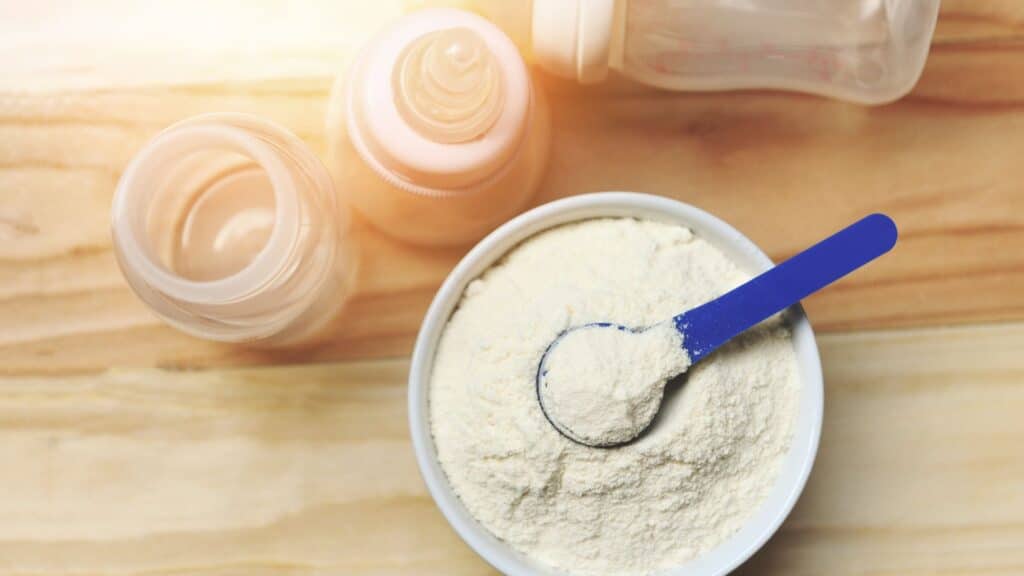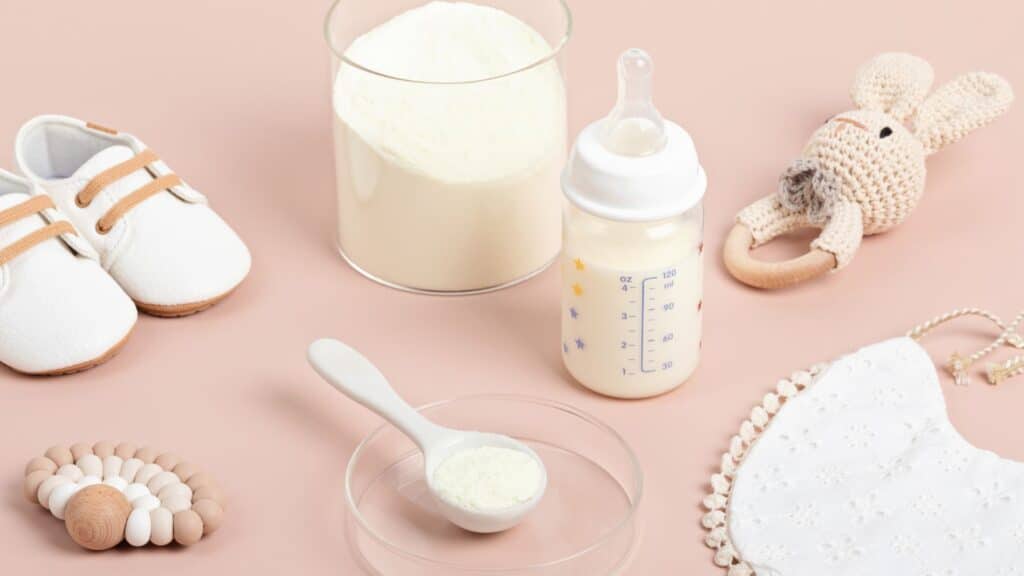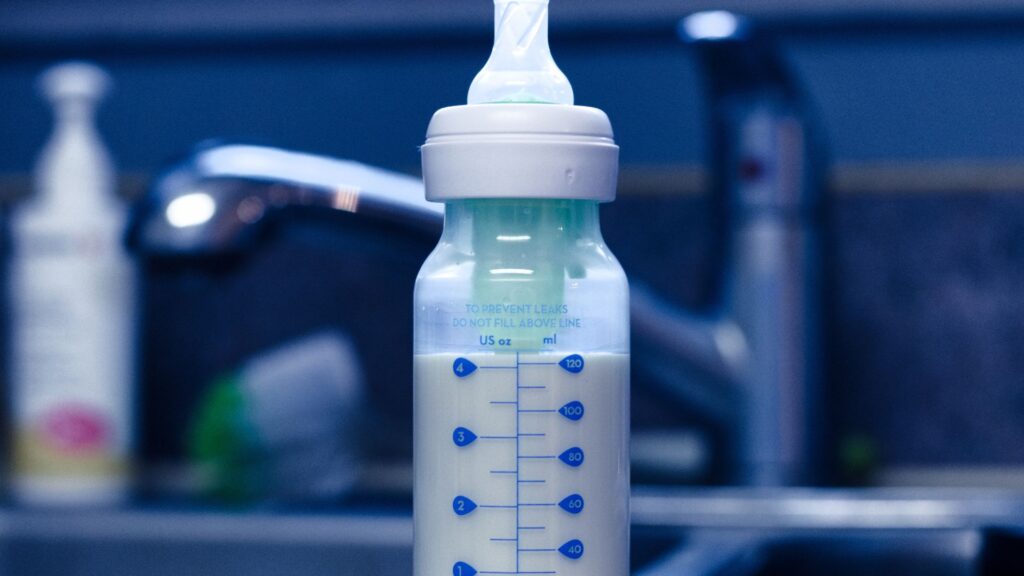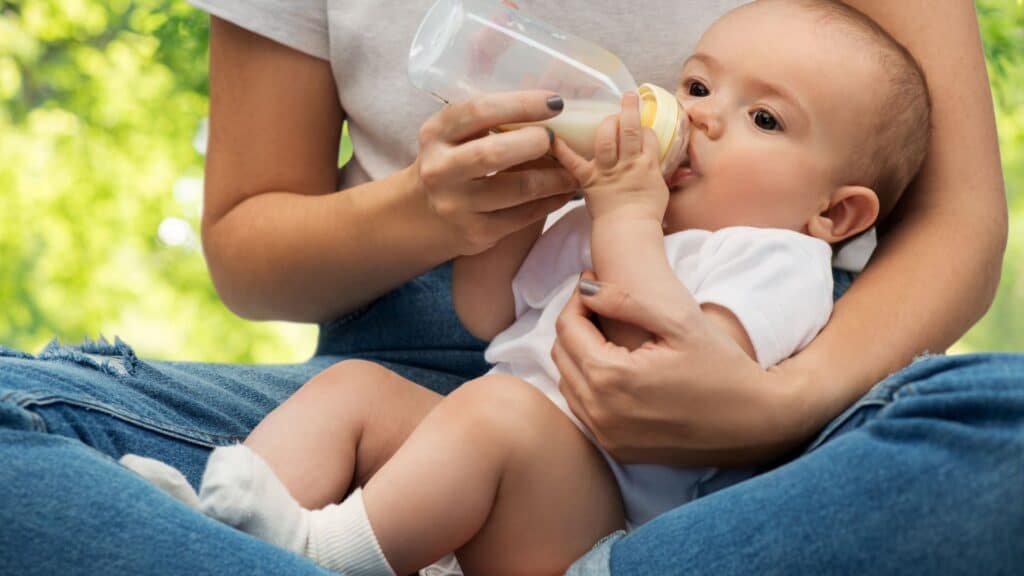When comparing powder vs liquid formula, parents aim for the best for their children. If you’ve recently decided on formula feeding, you may wonder which type to choose.
When choosing a formula for your baby, you have two main options – powder or liquid. Both of these can provide essential nutrients for your little one, so it is crucial to learn more about them before making a decision.
To help make your choice much easier, let’s take a closer look at the differences between each infant formula and which one will work best based on your needs.

What is Powder Baby Formula?
A powdered formula is essentially sold in the market as powders in various formulations, which are reconstituted with distilled water before using it. It is the most economical and widely available type of formula, making it a popular choice among parents.
It is also easy to store and transport while creating less waste than ready-to-feed liquid formula. While most powder formula packaging brands advertise unique ingredients, most contain similar fundamental ingredients.
Powder formula often comes in a canister containing a little scoop. It’s also sold in little packets, so you can carry it anywhere [1]. Powder vs liquid formula, it is ideal for parents and caregivers on a tight budget who have little time to prepare their baby’s milk during travels.
How to Prepare Powdered Formula
Choose a Safe Water Source
Although most dental experts suggest using fluoridated water to mix powder vs liquid formula, infants fed with baby formula mixed with fluoridated water tend to consume excessive amounts of fluoride. When this happens, they become prone to fluorosis, permanently staining your child’s baby teeth and even permanent teeth.
That’s why it’s highly advisable to choose an alternative source of water to ensure that they only get a substantial amount of fluoride when mixing powder formula. Besides mineral water, another excellent option that you can consider is distilled water.
Use Cold Water
For those using tap water to mix their ready-to-feed formula, it’s best to run the water for half a minute before putting it in your baby’s bottle. Remember that many houses have lead content right in their plumbing systems. When consumed, high lead levels may affect your baby’s growth.
Meanwhile, although cold water may pick up less lead compared to hot water, it can still absorb possibly harmful contaminants which may affect your baby’s health. So, using filtered water when mixing your ready-to-feed formula is highly advisable to avoid possible exposure to harmful chemicals.
Boil the Water if Needed
Although most ready-to-feed infant formulas don’t directly advise parents to boil water, it is highly advisable if you feel it is unsafe when used for baby formula. The idea behind boiling it is to ensure the water is sterilized before mixing it with powder formula.
You may consider bringing it to a rolling boil for about a minute before letting it cool down. Only attempt to boil it within the advised period, or it may only increase the impurity levels.
Measure it Properly
When preparing your baby’s powder formula, it’s always best to ensure that you get the right measurement for all ingredients. Babies can get sickened when using too much water or too much powder formula when you feed your baby. So, make sure you use a measuring scoop to get the exact formulation for proper nutritional value.
Shake it Well
Shake the bottle well to thoroughly blend your ready-to-feed formula before giving it to your baby. Doing so guarantees that your baby receives the right amount of nutrients based on the nutritional standards set by experts.

What is Liquid Concentrate Baby Formula?
Liquid concentrate formula is another commonly used option that requires sterilized or distilled water before giving it to your baby. Compared to other types of formula, this type is sterile, which means that it’s free of any bacteria that may potentially harm your baby. However, you still need to be cautious about using it when preparing one for your baby.
When using liquid concentrate infant formula, it’s best to wash your hands to prevent contamination thoroughly. It will also be best to do the same with your work area.
Additionally, you must sterilize or distill the water and ensure it is at room temperature before adding the liquid concentrate formula. Afterward, shake the prepared bottle until all powder has dissolved.
How to Prepare Concentrated Liquid Formula
Follow the Formula Instructions
Same with the powder formula, you need to follow the manufacturer’s instructions printed on the packaging of the liquid formula. Although most liquid formulas have similar directions, always follow the label’s instructions to ensure your baby receives all the nutrients.
Use the Right Water
Once you cool sterile water to 68-98°F, you can mix it with formula products. It should feel between your body and room temperature to prevent burning your baby.
Get the Right Measurement
You must mix the right amount of liquid formula concentrate with water during your preparation. Adding too much water will only make it thinner, while using less water than instructed will only make the concentrate thick, making it potentially dangerous for your baby.
Only Use the Same Type of Formula
Never attempt to mix different formulas in the same bottle. Also, adding other types of drinks or feeds could only cause them to choke when sleeping potentially. Mixing the wrong formulas could also cause indigestion and allergies in your baby. The only type of formula you can mix is those with the same nutrient source.

How to Store Baby Formula
- Leftover used formula can quickly spoil when left in an area at room temperature. So, it’s best to consume your ready-to-feed formula within 2 hours after preparing it or an hour from when you start feeding your baby.
- It’s also best to dispose of any remaining infant formula in the bottle after feeding your baby. The bacteria from your baby’s saliva and the infant formula can trigger bacteria to start growing. So, ensure that you sanitize all the tools before bottle feeding.
- Meanwhile, it will be best to store unopened infant formula in a cool, dry place with a tightly closed lid. This rule applies to both powder vs liquid formula products.
- Most baby formula products must be consumed within 30 days of opening the canister. So, it’s advisable to write the date on the top of the lid where it’s visible so you’ll know when to dispose of it.
How To Choose What Formula To Feed Your Baby
Availability
When choosing the right formula for your baby, it’s always best to choose what’s convenient for you. Choose a product that’s easily accessible in your area. If it’s hard to get one in your area, or you’d have to travel to a different site, then it’s best to consider another set of formulas instead.
Overall Cost
It’s best to find a product that’s not heavy on the pocket but will still provide your baby with the nutrients essential for growth. Compare different brands’ prices to see which offers the best value for money. You can also take advantage of promotional offers and discounts from online stores. Remember to factor in shipping fees if you buy online.
Science-based
It’s typical for a formula brand to use convoluted words to make it sound like they offer a unique formulation that’ll make a difference in your child’s nutrition. Although it’s okay, it’s best to look for a product backed by science. Make sure the ingredients have been proven or are being researched as beneficial.
Stick with the Formula
When you find a brand that works well with your baby, it’s highly advisable to stick with it until your baby’s doctor advises otherwise. It may be tempting to switch brands and formulas, especially when looking for the best value, but doing so can cause digestive issues and other problems. If your baby needs a change in formula, it’s important to introduce it gradually over several days.

Conclusion
It’s always best to choose a formula type that will provide your baby with optimum nutrition. Unless your baby has certain medical conditions that require a specific type of formula, the best formula for your baby is typically the one that works well with their digestive system and provides the essential nutrients they need to grow. Do your research to ensure the ingredients have been proven or are being researched as beneficial. When you find a brand that’s working, it’s usually best to stick with it until your doctor gives you a signal to look for another brand.
Did this article help? If so, leave a comment down below. If you have any questions, we’re always here to help!



